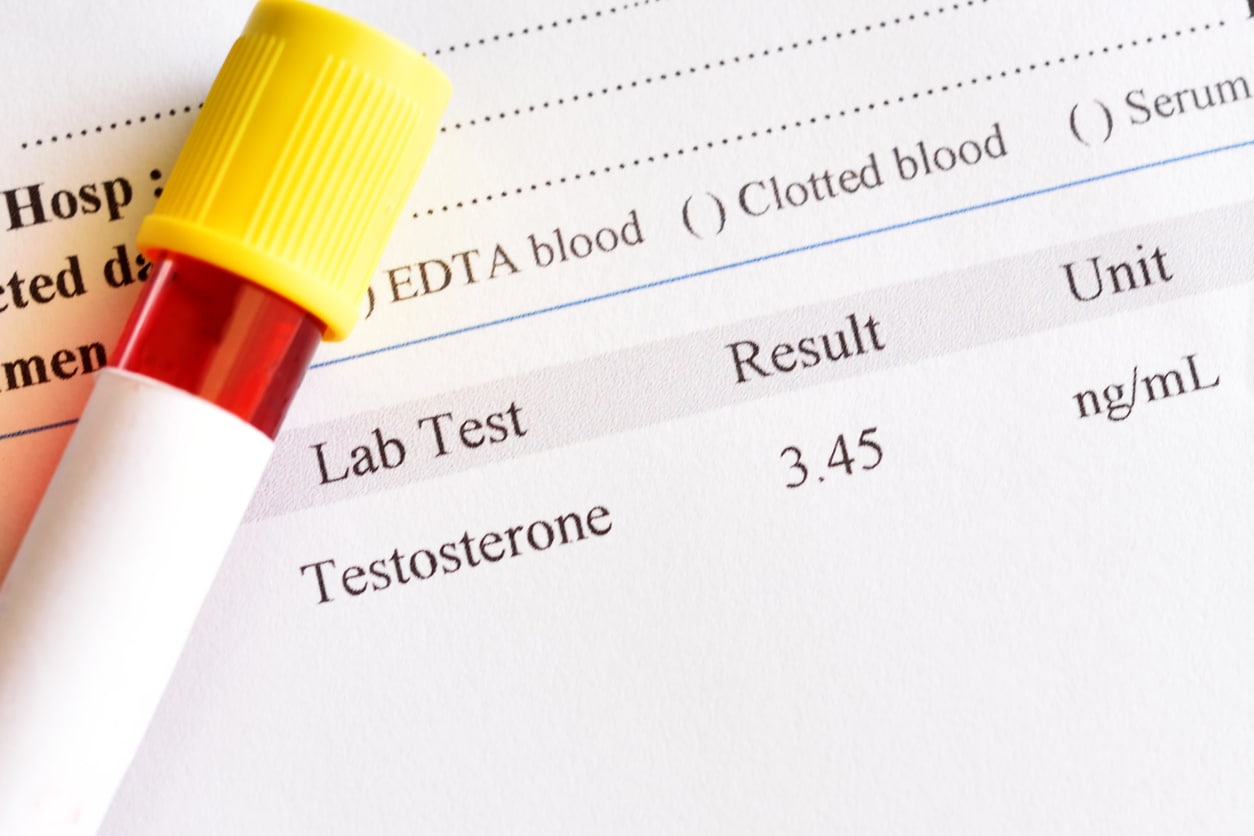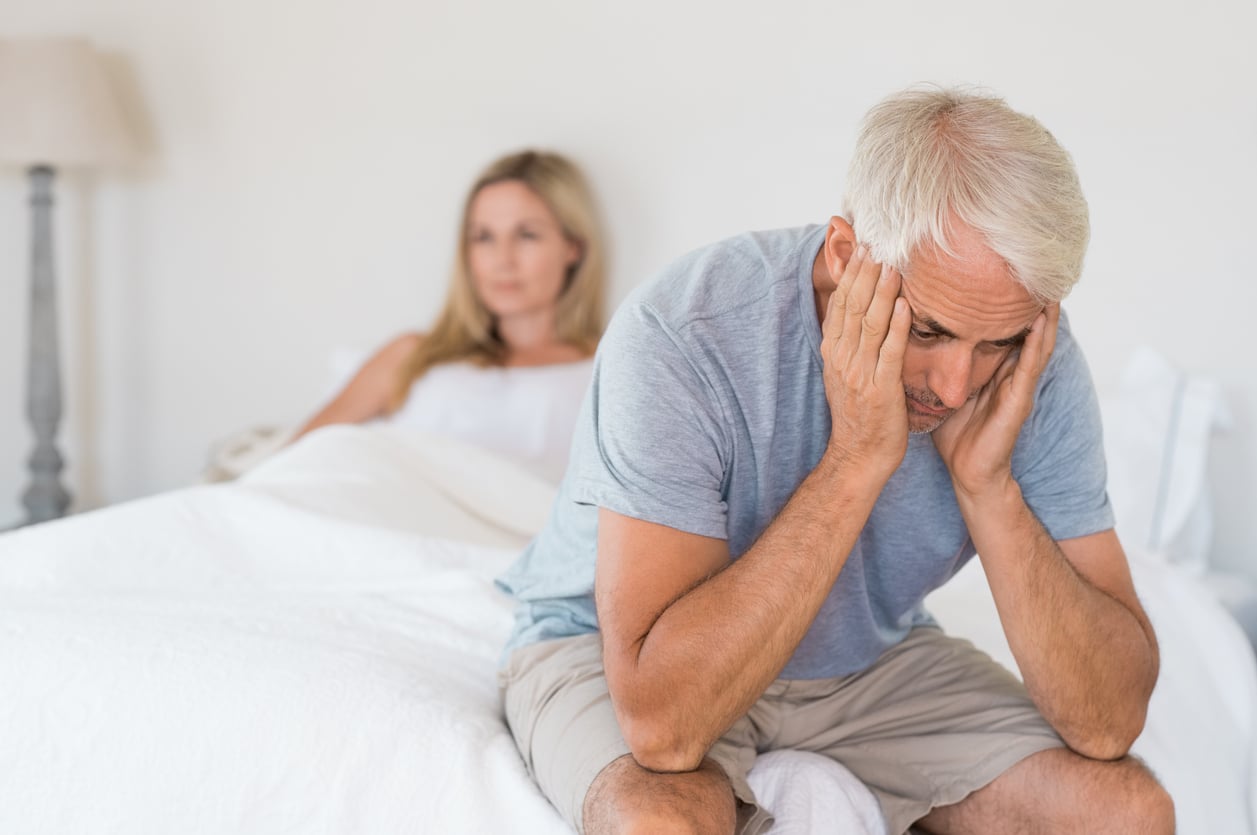You’ve been together for years and years, but lately, something’s changed. Your loving man has become increasingly snappy, short, and hurtful in daily interactions. It’s possible that you may be dealing with Irritable Male Syndrome (IMS). I know you’re probably thinking, “That sounds made up!” I thought so too, but there is a real, scientific explanation for why you may be going through a rough patch with your husband.
It’s not your imagination. Men are impacted by hormonal mood changes too, but our society doesn’t really recognize these changes as frequently or openly as we do female menopause and all its spoils. Nevertheless, when we talk about Irritable Male Syndrome, or “male menopause,” as it is sometimes called, we are talking about mood, and physical changes brought about by low testosterone levels, which gradually decrease over time.
Lowered testosterone levels can contribute to feelings of irritability, depression, or anger in men. He and his partner might also notice a persistent loss of sex drive, frequent erectile dysfunction, and similar symptoms.
Testosterone fluctuations can have multiple causes, including stress, conflict, and aging. We are familiar with what “too much” testosterone can do, presenting as anger, aggression, and hostility. We often associate this with teenage boys and athletes. However, this is also a problem when testosterone levels are too low.
The Male Menopause Debate
Both the terms “Irritable Male Syndrome” and “male menopause” are contested, by the way.
Male menopause (if we call it that) is quite different from female menopause, and doctors debate whether these terms are actually useful.
“Female menopause” refers to the rapid peri-menopause stage when women go through numerous physical changes, including plummeting estrogen production. Some argue the hormonal process isn’t the same for men, as testosterone levels drop very gradually over the course of many years. Additionally, as the word menopause quite literally refers to pausing the menstrual cycle, it’s not necessarily applicable to males.
Late-Onset Hypogonadism
The gradual decline of testosterone levels is more accurately or medically referred to as late-onset hypogonadism or age-related low testosterone. While testosterone levels commonly decrease as men age, most men maintain levels that are within a normal range for their age group.
The theory is that ISM, therefore, isn’t experienced by everyone. Often, it is attributed to men whose testosterone falls below normal levels. It’s important to note that not all men’s testosterone levels fall below healthy levels or low enough to trigger IMS symptoms.
Dr. Gerald Lincoln, a Scottish researcher, and endocrinologist, is credited with coining the terms “Irritable Male Syndrome” and “andropause.” In his research, Lincoln found that falling testosterone levels caused animals to become more irritable, biting their cages and the researchers who were testing them. According to Dr. Lincoln, men with low testosterone tended to be impatient, sarcastic, and argumentative.
Irritable Male Syndrome Diagnosis and Prevention
 Low testosterone levels in older men often go unnoticed with the many other physical and emotional changes happening during these years.
Low testosterone levels in older men often go unnoticed with the many other physical and emotional changes happening during these years.
Symptoms like reduced sexual desire and activity, infertility, height loss, and hot flashes can also be caused by age, medication, or a body mass index of more than 30. Although not routinely done, doctors can check testosterone levels by performing a blood or saliva test.
Mayo Clinic reports that a man’s testosterone levels decline on average about 1% a year after age 40. Most older men still have levels that are within a normal range. However, an estimated 10 to 25% of men have testosterone levels that are considered to be low, yet many of these men experience no symptoms.
To safeguard against falling testosterone levels and the symptoms that coincide with IMS and hormone imbalance, men can:
- Drink less. Alcohol consumption can raise estrogen levels and throw testosterone/estrogen levels out of sync.
- Eat more healthy carbs like potatoes, rice, beans, squash, and other veggies. Healthy carbohydrates prevent serotonin levels from falling, which prevents irritability and supports a positive mood.
- Lose weight (if you need to). Fat cells convert testosterone to estrogen; losing weight keeps testosterone levels up.
- Practice open and caring communication with their partner. Many health experts recommend maintaining a dialogue with their partner about feelings, physical changes, and concerns (even things like persistent grumpiness). If opening up seems particularly difficult, Cognitive Behavioral Therapy could help.
The Scoop on Hormone Replacement Therapy

Some men have turned to hormone replacement therapy or testosterone replacement therapy to feel better and improve their health. While this is an option, it is one that deserves careful consideration.
Treatment recommendations for older men with low testosterone vary depending on who you ask.
In 2020, the American College of Physicians recommended doctors consider starting testosterone treatment in men who want to improve their sexual function — after explaining the risks and benefits of therapy.
However, many experts will test older men for low testosterone only if they are experiencing signs or symptoms of the condition. Then, if a test confirms lower-than-average testosterone, they must repeat the testing to confirm the results. The next step is testing the pituitary gland to determine the root cause of declining testosterone levels and rule out other hormone deficiencies. Sometimes, treatment is offered to men with age-related low testosterone without any symptoms.
If a man wants to begin testosterone therapy, his doctor will explain the different ways to administer testosterone, target levels, and follow-up testing.
Some men who have undergone testosterone therapy report relief from symptoms like persistent irritability, loss of desire, etc. Unfortunately, the benefits of receiving therapy were not so clear for some others.
Finally, this treatment comes with possible risks. Though further research is needed, testosterone therapy could worsen sleep apnea, stimulate the growth of metastatic prostate cancer, and contribute to blood clot formation.
A Topic Worthy of Discussion

When men enter their late 40s and 50s, a shift is happening in their bodies and minds. Various physiological changes can contribute to feelings of irritability, depression, and anger. These challenging symptoms can cause some men to struggle and withdraw in life and their relationships.
Terms like “male menopause” and “Irritable Male Syndrome” have come into play to help describe physical changes that happen to men in middle age. While many believe testosterone deficiency plays a starring role in “old man grumpiness,” others say this particular brand of irritability is the result of combined physiological and psychological events. Some argue terms like “Irritable Male Syndrome” are mere catchy (marketable?) labels for natural changes that occur with age.
No matter what you call it, it is worth considering testosterone levels when moods are swinging so fast and hard that relationships become vulnerable. With awareness comes acceptance, support, and, ultimately, a plan to reclaim our health and wellness.
Read More:
Top 5 Questions Women Ask About Hormones







